Module 1 My First Day at Senior High Grammar 课件(44张)
文档属性
| 名称 | Module 1 My First Day at Senior High Grammar 课件(44张) | 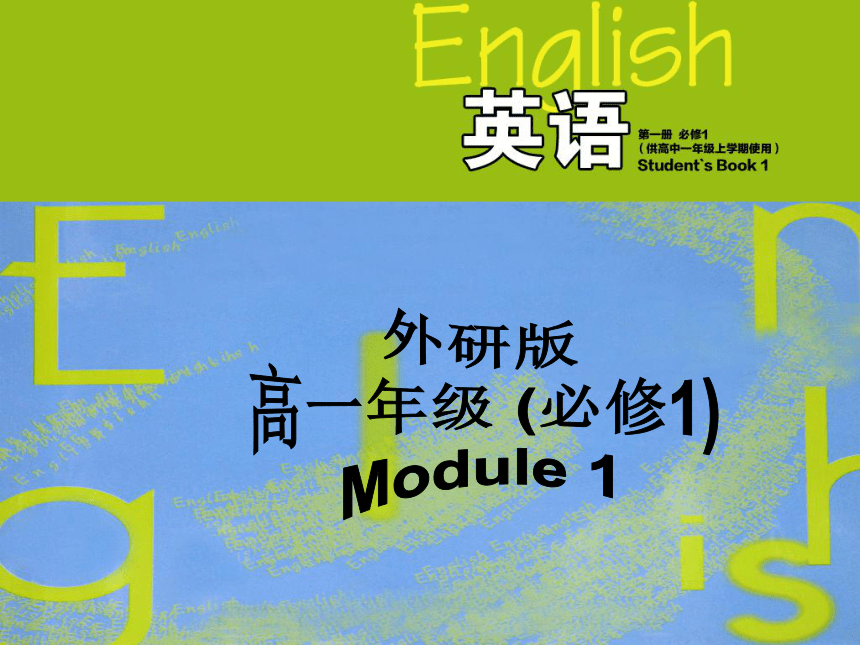 | |
| 格式 | zip | ||
| 文件大小 | 982.4KB | ||
| 资源类型 | 教案 | ||
| 版本资源 | 外研版 | ||
| 科目 | 英语 | ||
| 更新时间 | 2019-08-06 21:26:19 | ||
图片预览

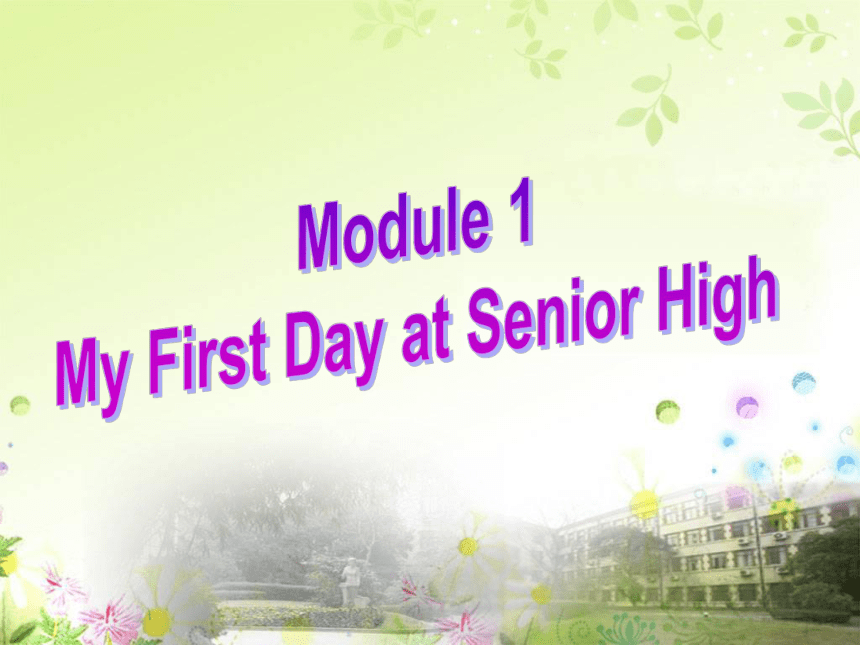
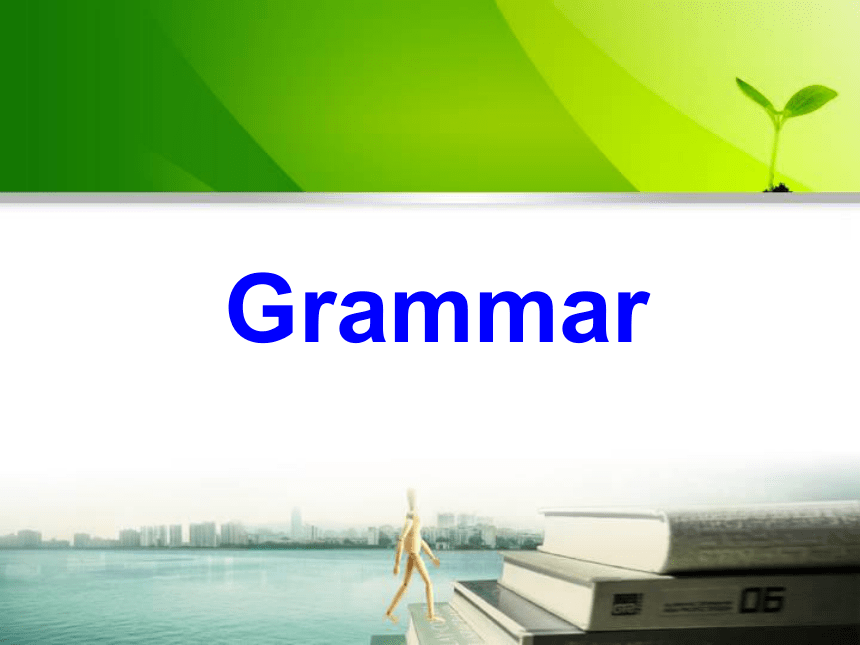
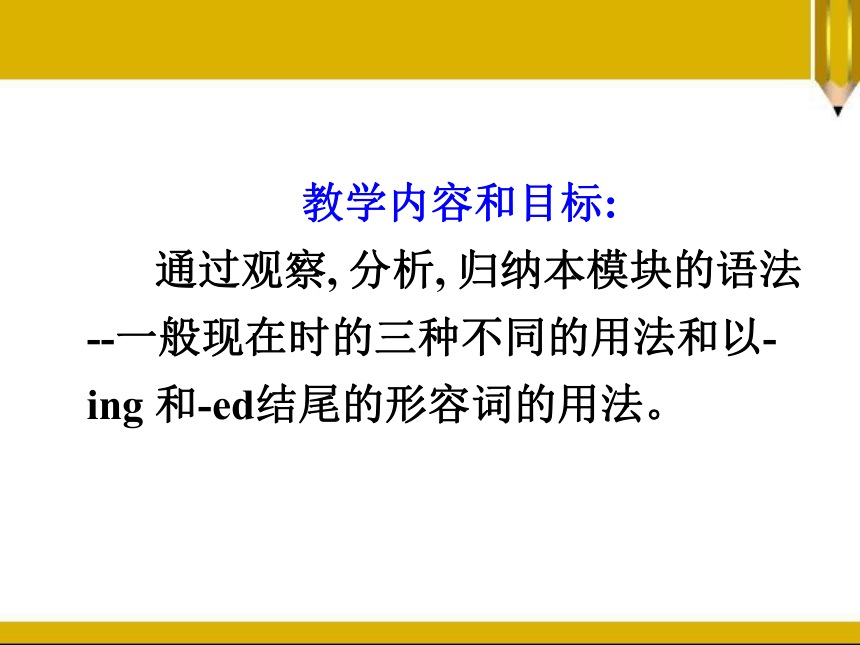
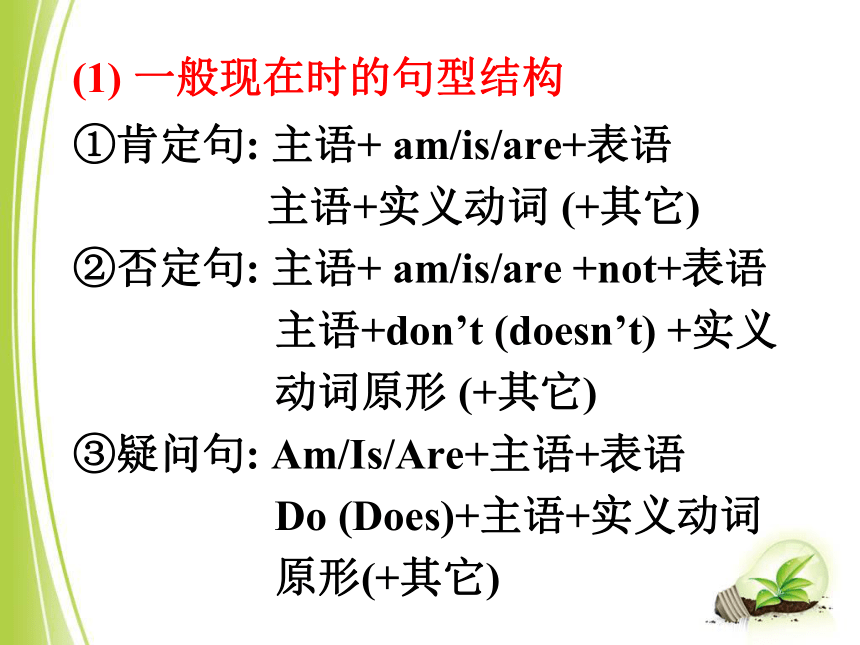
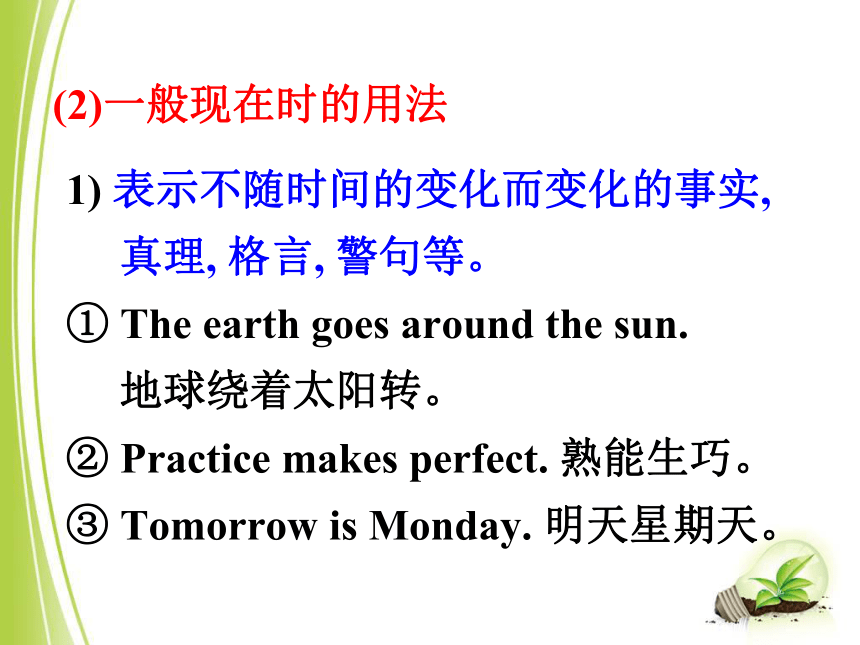
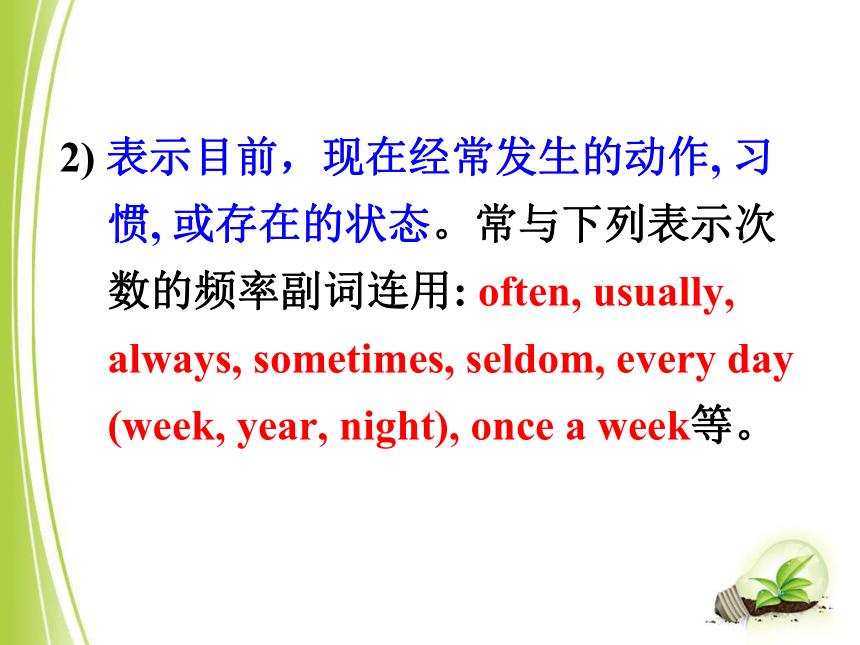
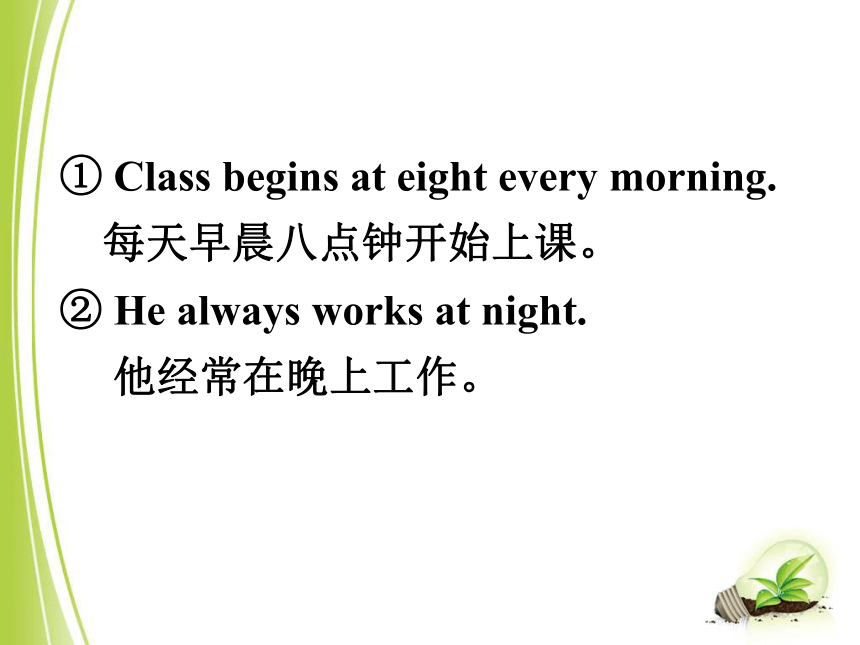
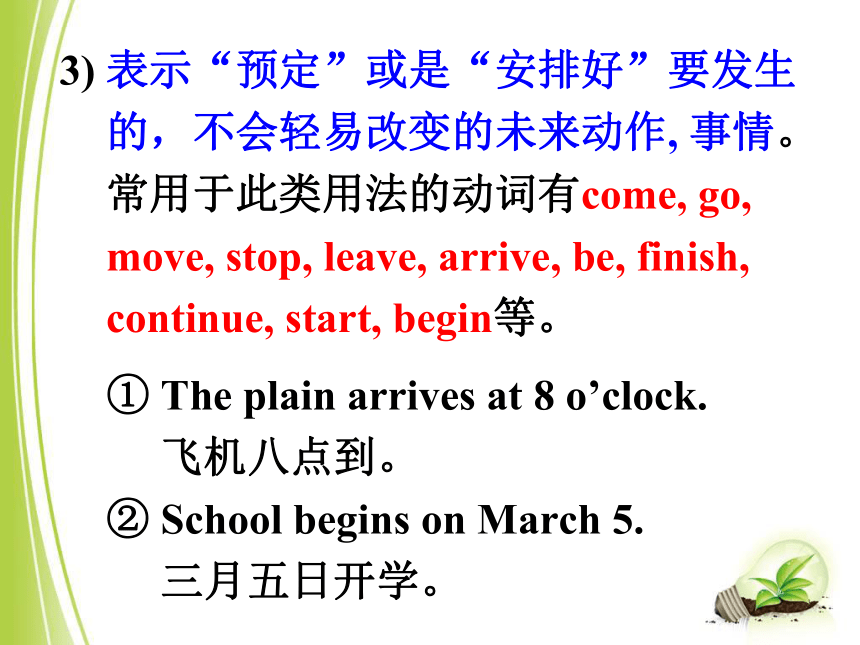
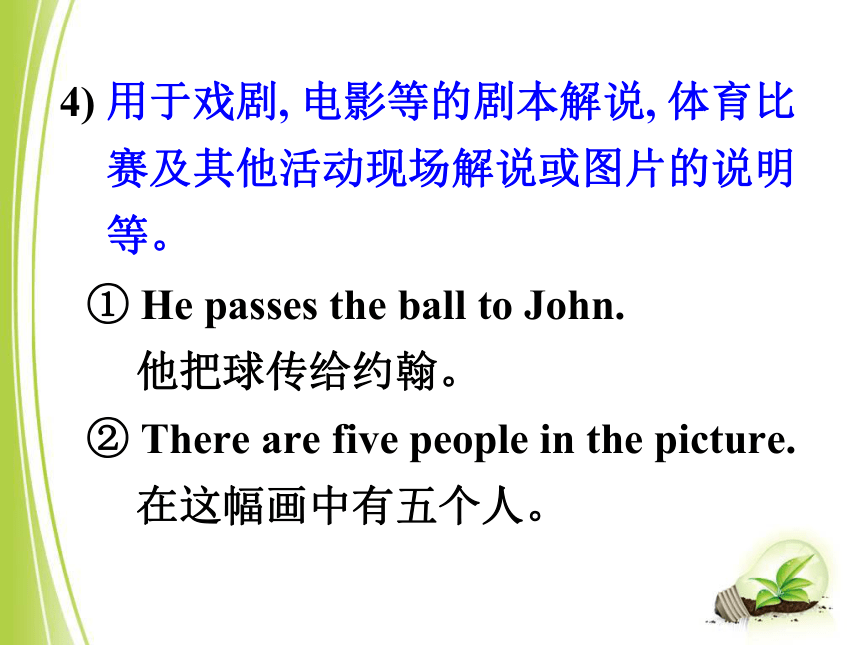
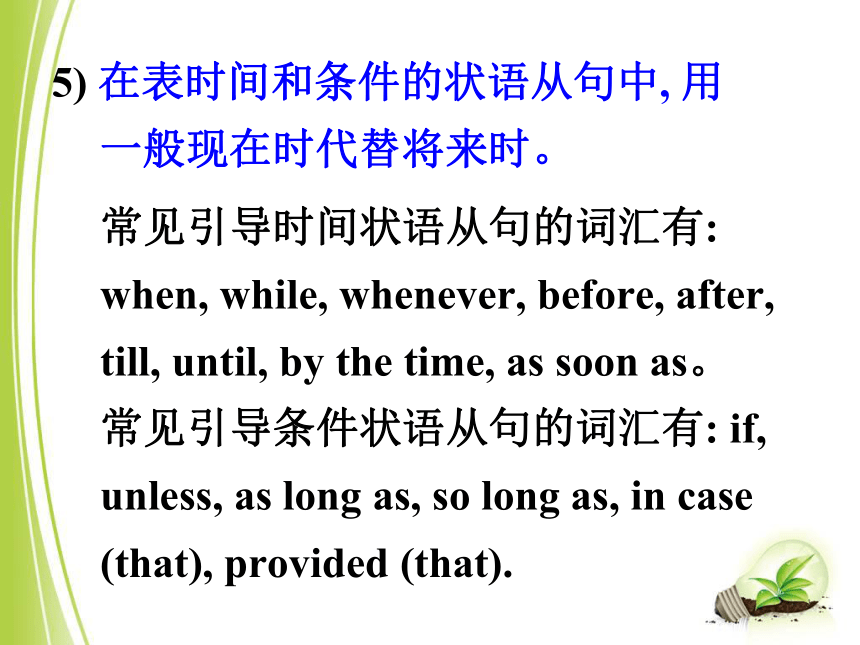
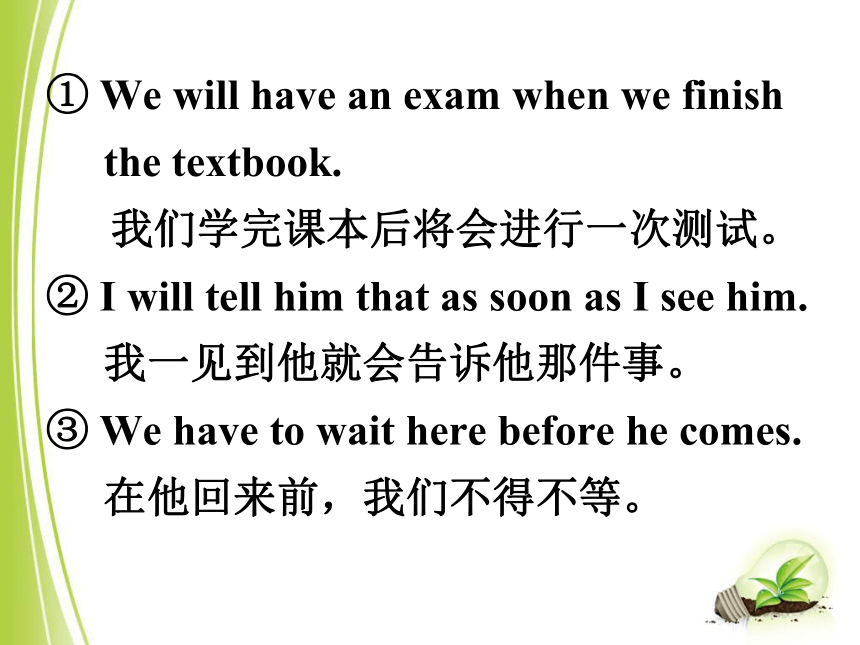
文档简介
课件44张PPT。外研版
高一年级 (必修1)
Module 1 Module 1
My First Day at Senior HighGrammar教学内容和目标:
通过观察, 分析, 归纳本模块的语法--一般现在时的三种不同的用法和以-ing 和-ed结尾的形容词的用法。(1) 一般现在时的句型结构 ①肯定句: 主语+ am/is/are+表语
主语+实义动词 (+其它)
②否定句: 主语+ am/is/are +not+表语 主语+don’t (doesn’t) +实义 动词原形 (+其它)
③疑问句: Am/Is/Are+主语+表语 Do (Does)+主语+实义动词原形(+其它) (2)一般现在时的用法 1) 表示不随时间的变化而变化的事实, 真理, 格言, 警句等。
① The earth goes around the sun. 地球绕着太阳转。
② Practice makes perfect. 熟能生巧。
③ Tomorrow is Monday. 明天星期天。2) 表示目前,现在经常发生的动作, 习惯, 或存在的状态。常与下列表示次数的频率副词连用: often, usually, always, sometimes, seldom, every day (week, year, night), once a week等。 ① Class begins at eight every morning.
每天早晨八点钟开始上课。
② He always works at night.
他经常在晚上工作。3) 表示“预定”或是“安排好”要发生的,不会轻易改变的未来动作, 事情。常用于此类用法的动词有come, go, move, stop, leave, arrive, be, finish, continue, start, begin等。① The plain arrives at 8 o’clock.
飞机八点到。
② School begins on March 5.
三月五日开学。4) 用于戏剧, 电影等的剧本解说, 体育比赛及其他活动现场解说或图片的说明等。 ① He passes the ball to John. 他把球传给约翰。
② There are five people in the picture. 在这幅画中有五个人。5) 在表时间和条件的状语从句中, 用一般现在时代替将来时。 常见引导时间状语从句的词汇有: when, while, whenever, before, after, till, until, by the time, as soon as。
常见引导条件状语从句的词汇有: if, unless, as long as, so long as, in case (that), provided (that). ① We will have an exam when we finish the textbook.
我们学完课本后将会进行一次测试。
② I will tell him that as soon as I see him.我一见到他就会告诉他那件事。
③ We have to wait here before he comes.在他回来前,我们不得不等。(1) I have been living outside Qingdao for a long time now but I __ back there every few weeks to see my parents. A. am going B. had gone C. would be going D. go
(2) Give her the book when you ____. A. will meet her. B. meets her C. meet her D. meeting her. (3) ----I want to write Yang Liwei a letter, but I don’t have any stamps.
----I’ll buy some for you, if I ___ to the post office. A. go B. shall go C. will go D. went6) 询问或引用书籍、通知或新近接到的信件的内容时, 常将一般现在时与动词say连用。如:—What does the notice say?
—It says, “No parking.”
—那通知说什么?
—通知说:“不准停放车辆。”7) 表示计划好的将来行动或一系列行动,特别是指旅途中的行动。如:
We leave London at 10:00 next
Tuesday and arrive in Paris at 13:00.
We spend two hours in Paris and
leave again at 15:00. We arrive in
Rome at 19:30, spend four hours in
Rome…The present continuous tense
现在进行时 (1) 现在进行时的基本结构① 肯定句: 主语+ am/is/are+ 现在分词
② 否定句: 主语+ am/is/are+ not+现在分词
③ 疑问句:Am/Is/Are +主语+现在分词 (2) 现在进行时的用法1) 表示说话时正在进行的, 目前正在发生的动作。此种用法时, 常带有表示目前时刻的时间副词, 如: now, at the (very) moment, for the time being, at present, 及Look!, Listen!等词汇。 ① Look! The big bird is flying away. 看, 那只大鸟正在飞走。
② He is watching a movie now. 他现在正在看电影。
2) 表示目前一段时间内正在进行, 但说话时可能没有进行的动作。
Right now I am studying Chinese by distance learning.
我现在正通过远程教育学习汉语。 3) 与always, constantly, forever, all the time等副词连用, 表示动作反复或习惯。此时句子常含有说话者的强烈情感在内。表达较强的“责备”或“表扬”之意。① You are always changing your mind. 你总是主意不定。 (太烦人了)
② He is always helping others. 他总是帮助别人。 (他真是个好人。) 4) see, return, leave, start, visit, go, come, fly, stay等动词可以用进行时表将来。
① He is leaving on Wednesday.
他将于周四离开。
② They are going to Canada next week.
他们将下周去加拿大。5) 表示最近的将来已定的安排 (这是用于表示眼前打算的最普通的说法。)
I am meeting Peter tonight. He is taking me to the theatres. 今天晚上我要跟彼得会面。他要带我去看戏。从A、B、C、D四个选项中, 选出可以填入空白处的最佳选项。
1. —Have you got any job offers?
—No. I _____.
A. waited B. had been waiting
C. have waited D. am waitingExercises2. According to the timetable, the train for Shanghai _____ at 9 o’clock in the evening.
A. leaves B. has left
C. was left D. will leave3. Put on your coat! I _____ you down to the doctor.
A. took B. was taking
C. am taking D. take4. We’ll leave without saying goodbye to you if you _____ on time.
A. come B. will come
C. won’t come D. don’t come 形容词化了的-ing分词和-ed分词用作名词修饰语时, 仍保留一定的动词含义。一般说来, 由及物动词的-ing分词转化来的形容词往往带有主动意义, 常译为“使人……; 令人……”; 由及物动词的-ed分词转化来的形容词往往带有被动含义,用来形容人感到如何。1. The girl let out a _________ cry at the sight of the snake. 看到蛇, 女孩尖叫起来。 frightenedThe girl was frightened. 2. His __________ shout scared the boys.他大吼一声把那帮男孩给吓跑了。
The shout was frightening and the boys felt frightened. frighteningHis puzzled look made me very angry.
他迷惑的样子使我很生气。
The exciting news made every one of us very excited.
那令人兴奋的消息使我们每个人都很兴奋。
None of the banks I spoke to were interested.
我去找过的银行没有一家感兴趣。William Hartley looked disappointed when the bookseller refused the request.
当店员拒绝他的请求时,威廉·哈特利显得很失望。
Defarge was pleased at their arrival.
对于他们的到来,德法奇感到很高兴。
That sounds very interesting.
那听起来倒挺有趣的。这类词常见的有:interesting 有趣的;interested 感兴趣的
disappointing 令人失望的;disappointed 失望的
exciting 令人兴奋的;excited 激动的
surprising 令人惊奇的;surprised 惊奇的astonishing 惊人的;astonished 感到惊奇的
discouraging 令人泄气的;discouraged 泄气的
puzzling 令人迷惑的;puzzled 迷惑的
tiring 令人厌倦的;tired 疲劳的pleasing 令人高兴的;pleased 高兴的
satisfying 令人满意的;satisfied 满意的
worrying 令人担心的;worried 担心的
frightening 恐怖的;frightened 受惊的
boring 乏味的;无聊的
delighted 高兴的
devoted 忠实的1.?The situation is more ____ than ever.
I’m _____ about what to do next.
A. puzzled; puzzled
B. puzzling; puzzling
C. puzzling; puzzled
D. puzzled; puzzling Exercises 2.?The ______ news ______ Jim. He
was _____ at it.
A. surprising; surprised; surprised
B. surprised; surprised; surprising
C. surprised; surprising; surprised
D. surprised; surprising; surprising3. It was so ___ a poem that quite a
few students were _____ to tears.
A. moved; moved B. moving; moving
C. moving; moved D. moved; moving 4. China is a large country which is
getting ______.
A. more and more developed
B. more and more developing
C. more developed and more developed
D. more developing and more
developing 5. —How did Jack do in the exams this
time?
—Well, his parents seem _____ with
his results.
A. pleasing B. pleasure
C. pleased D. pleasant 6. It is _____ to travel by air than by water.
A. a lot more excited
B. much exciting
C. a lot more exciting
D. much more excited
7. They are _____ at the news that their
team was beaten by ours.
A. disappointing B. disappointed
C. surprising D. pleased8. — How did Jack do in this exam?
— Well, his parents seem _____ with
his results.
A. pleasing B. pleasure
C. pleased D. pleasant 动词填空:
1. Hearing the _______ news, we were all ______. (excite)
2. All of us were _______ by the
________ maths problem. (puzzle)exciting excited puzzled puzzling 3. The dishes tasted nice, making me
______ (please).pleased 4. He hadn’t expected the result, which
can be seen from his _________ look.
(surprise)
5. A lot of young people are _________ in
the __________ game. (interest)surprised interesting interested
高一年级 (必修1)
Module 1 Module 1
My First Day at Senior HighGrammar教学内容和目标:
通过观察, 分析, 归纳本模块的语法--一般现在时的三种不同的用法和以-ing 和-ed结尾的形容词的用法。(1) 一般现在时的句型结构 ①肯定句: 主语+ am/is/are+表语
主语+实义动词 (+其它)
②否定句: 主语+ am/is/are +not+表语 主语+don’t (doesn’t) +实义 动词原形 (+其它)
③疑问句: Am/Is/Are+主语+表语 Do (Does)+主语+实义动词原形(+其它) (2)一般现在时的用法 1) 表示不随时间的变化而变化的事实, 真理, 格言, 警句等。
① The earth goes around the sun. 地球绕着太阳转。
② Practice makes perfect. 熟能生巧。
③ Tomorrow is Monday. 明天星期天。2) 表示目前,现在经常发生的动作, 习惯, 或存在的状态。常与下列表示次数的频率副词连用: often, usually, always, sometimes, seldom, every day (week, year, night), once a week等。 ① Class begins at eight every morning.
每天早晨八点钟开始上课。
② He always works at night.
他经常在晚上工作。3) 表示“预定”或是“安排好”要发生的,不会轻易改变的未来动作, 事情。常用于此类用法的动词有come, go, move, stop, leave, arrive, be, finish, continue, start, begin等。① The plain arrives at 8 o’clock.
飞机八点到。
② School begins on March 5.
三月五日开学。4) 用于戏剧, 电影等的剧本解说, 体育比赛及其他活动现场解说或图片的说明等。 ① He passes the ball to John. 他把球传给约翰。
② There are five people in the picture. 在这幅画中有五个人。5) 在表时间和条件的状语从句中, 用一般现在时代替将来时。 常见引导时间状语从句的词汇有: when, while, whenever, before, after, till, until, by the time, as soon as。
常见引导条件状语从句的词汇有: if, unless, as long as, so long as, in case (that), provided (that). ① We will have an exam when we finish the textbook.
我们学完课本后将会进行一次测试。
② I will tell him that as soon as I see him.我一见到他就会告诉他那件事。
③ We have to wait here before he comes.在他回来前,我们不得不等。(1) I have been living outside Qingdao for a long time now but I __ back there every few weeks to see my parents. A. am going B. had gone C. would be going D. go
(2) Give her the book when you ____. A. will meet her. B. meets her C. meet her D. meeting her. (3) ----I want to write Yang Liwei a letter, but I don’t have any stamps.
----I’ll buy some for you, if I ___ to the post office. A. go B. shall go C. will go D. went6) 询问或引用书籍、通知或新近接到的信件的内容时, 常将一般现在时与动词say连用。如:—What does the notice say?
—It says, “No parking.”
—那通知说什么?
—通知说:“不准停放车辆。”7) 表示计划好的将来行动或一系列行动,特别是指旅途中的行动。如:
We leave London at 10:00 next
Tuesday and arrive in Paris at 13:00.
We spend two hours in Paris and
leave again at 15:00. We arrive in
Rome at 19:30, spend four hours in
Rome…The present continuous tense
现在进行时 (1) 现在进行时的基本结构① 肯定句: 主语+ am/is/are+ 现在分词
② 否定句: 主语+ am/is/are+ not+现在分词
③ 疑问句:Am/Is/Are +主语+现在分词 (2) 现在进行时的用法1) 表示说话时正在进行的, 目前正在发生的动作。此种用法时, 常带有表示目前时刻的时间副词, 如: now, at the (very) moment, for the time being, at present, 及Look!, Listen!等词汇。 ① Look! The big bird is flying away. 看, 那只大鸟正在飞走。
② He is watching a movie now. 他现在正在看电影。
2) 表示目前一段时间内正在进行, 但说话时可能没有进行的动作。
Right now I am studying Chinese by distance learning.
我现在正通过远程教育学习汉语。 3) 与always, constantly, forever, all the time等副词连用, 表示动作反复或习惯。此时句子常含有说话者的强烈情感在内。表达较强的“责备”或“表扬”之意。① You are always changing your mind. 你总是主意不定。 (太烦人了)
② He is always helping others. 他总是帮助别人。 (他真是个好人。) 4) see, return, leave, start, visit, go, come, fly, stay等动词可以用进行时表将来。
① He is leaving on Wednesday.
他将于周四离开。
② They are going to Canada next week.
他们将下周去加拿大。5) 表示最近的将来已定的安排 (这是用于表示眼前打算的最普通的说法。)
I am meeting Peter tonight. He is taking me to the theatres. 今天晚上我要跟彼得会面。他要带我去看戏。从A、B、C、D四个选项中, 选出可以填入空白处的最佳选项。
1. —Have you got any job offers?
—No. I _____.
A. waited B. had been waiting
C. have waited D. am waitingExercises2. According to the timetable, the train for Shanghai _____ at 9 o’clock in the evening.
A. leaves B. has left
C. was left D. will leave3. Put on your coat! I _____ you down to the doctor.
A. took B. was taking
C. am taking D. take4. We’ll leave without saying goodbye to you if you _____ on time.
A. come B. will come
C. won’t come D. don’t come 形容词化了的-ing分词和-ed分词用作名词修饰语时, 仍保留一定的动词含义。一般说来, 由及物动词的-ing分词转化来的形容词往往带有主动意义, 常译为“使人……; 令人……”; 由及物动词的-ed分词转化来的形容词往往带有被动含义,用来形容人感到如何。1. The girl let out a _________ cry at the sight of the snake. 看到蛇, 女孩尖叫起来。 frightenedThe girl was frightened. 2. His __________ shout scared the boys.他大吼一声把那帮男孩给吓跑了。
The shout was frightening and the boys felt frightened. frighteningHis puzzled look made me very angry.
他迷惑的样子使我很生气。
The exciting news made every one of us very excited.
那令人兴奋的消息使我们每个人都很兴奋。
None of the banks I spoke to were interested.
我去找过的银行没有一家感兴趣。William Hartley looked disappointed when the bookseller refused the request.
当店员拒绝他的请求时,威廉·哈特利显得很失望。
Defarge was pleased at their arrival.
对于他们的到来,德法奇感到很高兴。
That sounds very interesting.
那听起来倒挺有趣的。这类词常见的有:interesting 有趣的;interested 感兴趣的
disappointing 令人失望的;disappointed 失望的
exciting 令人兴奋的;excited 激动的
surprising 令人惊奇的;surprised 惊奇的astonishing 惊人的;astonished 感到惊奇的
discouraging 令人泄气的;discouraged 泄气的
puzzling 令人迷惑的;puzzled 迷惑的
tiring 令人厌倦的;tired 疲劳的pleasing 令人高兴的;pleased 高兴的
satisfying 令人满意的;satisfied 满意的
worrying 令人担心的;worried 担心的
frightening 恐怖的;frightened 受惊的
boring 乏味的;无聊的
delighted 高兴的
devoted 忠实的1.?The situation is more ____ than ever.
I’m _____ about what to do next.
A. puzzled; puzzled
B. puzzling; puzzling
C. puzzling; puzzled
D. puzzled; puzzling Exercises 2.?The ______ news ______ Jim. He
was _____ at it.
A. surprising; surprised; surprised
B. surprised; surprised; surprising
C. surprised; surprising; surprised
D. surprised; surprising; surprising3. It was so ___ a poem that quite a
few students were _____ to tears.
A. moved; moved B. moving; moving
C. moving; moved D. moved; moving 4. China is a large country which is
getting ______.
A. more and more developed
B. more and more developing
C. more developed and more developed
D. more developing and more
developing 5. —How did Jack do in the exams this
time?
—Well, his parents seem _____ with
his results.
A. pleasing B. pleasure
C. pleased D. pleasant 6. It is _____ to travel by air than by water.
A. a lot more excited
B. much exciting
C. a lot more exciting
D. much more excited
7. They are _____ at the news that their
team was beaten by ours.
A. disappointing B. disappointed
C. surprising D. pleased8. — How did Jack do in this exam?
— Well, his parents seem _____ with
his results.
A. pleasing B. pleasure
C. pleased D. pleasant 动词填空:
1. Hearing the _______ news, we were all ______. (excite)
2. All of us were _______ by the
________ maths problem. (puzzle)exciting excited puzzled puzzling 3. The dishes tasted nice, making me
______ (please).pleased 4. He hadn’t expected the result, which
can be seen from his _________ look.
(surprise)
5. A lot of young people are _________ in
the __________ game. (interest)surprised interesting interested
